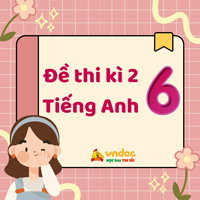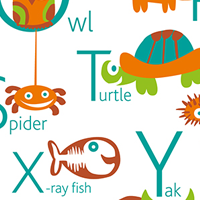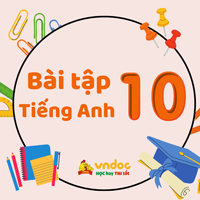Đề thi thử THPT Quốc gia 2018 môn tiếng Anh lần 1 trường THPT Chuyên Lê Quý Đôn có đáp án
Đề thi thử THPT Quốc gia 2018 môn tiếng Anh
VnDoc.com xin gửi đến các bạn Đề thi thử THPT Quốc gia 2018 môn tiếng Anh lần 1 trường THPT Chuyên Lê Quý Đôn có đáp án được sưu tầm và đăng tải dưới đây rất hữu ích cho các bạn đánh giá năng lực kiến thức cũng như các kĩ năng cần thiết trước khi bước vào kì thi đại học. Chúc các bạn thành công!
Read the following passage and write the letter A, B, C or D on the top of the first page to indicate the correct answer to each of the questions.
The incredible growth of the Internet over recent years has caused problems for parents and teachers. Parents worry about which sites their children spend time on, who they chat to online and the possible effects that computer games might have on them. For teachers, meanwhile, the main worry is the way the Internet makes cheating easier!
Schools and universities say there has been a huge increase in plagiarism – taking other people's words and ideas and pretending that they are your own. In the past, anyone who wanted to copy had to go to a library, find the right books, read through them, find the sections they needed and then physically write down the words they wanted to use. Nowadays, though, students can simply copy extracts from websites- while really desperate students sometimes copy whole essays! As if this wasn't bad enough, sites offering to actually do homework – at a price – have also started appearing.
Despite all this, we shouldn't assume that the Internet only brings problems. Indeed, you could say that for every problem the Internet creates, it also brings a solution. Parents can now use sophisticated controls to stop kids accessing sites that might do them harm, while new software helps teachers to detect copied work immediately. Many, of course, are already able to recognize when someone is cheating! Some students suddenly start using words they can't possibly understand like "dialectical antagonism","explains one teacher," or "parts of their essays feel different."
One of the hardest things for teachers today is deciding how to mix modern technology with traditional study skills – and how best to use the Web in class. As more and more schools install computers in every classroom, the role of the teacher is changing. Making sure students don't just copy things and do learn how to quote copied work properly is part of their job, but so is designing suitable projects to fully exploit the Web in helping students students learn about subjects and develop their life and social skills.
(adapted from Pre- Intermidiate Outcomes by Hugh Dellar $ Andrew Walkley)
Question 1. What is the passage mainly about?
A. Students wasting time on computer games B. The Interner making cheating easier
C. The effect that the Web is having on school life D. The Web used in projects to teach social skills
Question 2. The word “them” in paragraph 1 refers to______________________.
A. parents B. children C. games D. teachers
Question 3. According to the passage, which of the following statements is NOT true?
A. Plagiarismis copying someone's work and pretending it's your own.
B. Designing projects to take advantage of the Internet is one of parents' duties.
C. Many teachers can recognize when their students are cheating.
D. Parents can use some software to stop children assessing harmful sites.
Question 4. The word “this” in paragraph 2 refers to ________________.
A. copying other people's work B. finding the right books
C. sale of homework on the Web D. physically writing down words
Question 5. According to paragraph 3, teachers can recognize plagiarism because______________.
A. there is always a solution to the problem.
B. students leave clues from the original
C. the Internet makes parents and teachers worried.
D. students use perfect English, above their level.
Question 6. The word “detect” in paragraph 3 is closest in meaning to_____________
A. ignore B. notice C. admire D. confide
Question 7. Which of the following can be inferred from the passage?
A. The Internet has only bad impacts one ducation.
B. Many websites offer to do homework without fee.
C. The Internet can be used positively in education.
D. Parents don't want to control children's access to sites.
Read the following passage and write the letter A, B, C or D on the top of the first page to indicate the correct answer to each of the questions.
If we accept that we can not prevent science and technology from changing our world, we can at least try to ensure that the changes they make are in the right directions. In a democratic society, this means that the public needs to have a basic understanding of science, so that it can make informed decisions, and not leave them in the hands of experts. At the moment, the public has a rather ambivalent attitude toward science. It has come to expect the steady increase in the standard of living that new developments in science and technology have brought to continue, but it also distrusts science because it doesn't understand it. This distrust is evident in in the cartoon figure of the mad scientist, working in his laboratory to produce a Frankenstein. But the public also has a great interest in science, as is shown by the large audiences for science fiction.
What can be done to harness this interest, and give the public the scientific background it needs to make informed decisions on subjects like acid rain, the greenhouse effect, nuclear weapons and genetic engineering? Clearly, the basis must lie in what is taught in schools. But in schools, science is often presented in a dry and uninteresting manner. Children learn it by rote to pass examinations and they don't see its relevance to the world around them. Moreover, science is often taught in term of equations. Although equations are a concise and accurate way of describing mathematical ideas, they frighten most people.
The science people learn in school can provide the basic framework. But the rate of scientific progress is now so rapid, that there are always new developments that have occurred since one was at school or university. Popular books and magazine articles about science can help to put across new developments. But even the most successful popular book is read by only a small proportion of the population. There are some very good science programs on TV, but others present scientific wonders simply as magic, without explaining them, or showing how they fit into the framework of scientific ideas. Producers of television science programs should realise that they have a responsibility to educate the public, and not just entertain it.
What are the science-related issues that the public will have to make decisions on in the near future. By far the most urgent is that of nuclear weapons. Other global problems, such as food supply or the greenhouse effect, are relatively slow acting. But a nuclear war could mean the end of all human life on Earth, within days.
(adapted from Public Attitudes Toward Science by Stephen Hawking)
Question 8. What does the passage mainly dicuss?
A. The media can educate people about the most recent developments intechnology.
B. The public should be educated about science so they can make good decisions.
C. The science people learn in school can provide a basic framework for scientific understanding.
D. Many people don't trust science because they don't understand it.
Question 9. The word “it” in paragraph 1 refers to
A. the public B. science C. an expert D. technology
Question 10. According to the passage, the public feels .
A. negative about science fiction B. completely negative about science
C. completely positive about science D. ambivalent toward science
Đáp án Đề thi thử THPT Quốc gia môn tiếng Anh
Question 1 | C | Question 11 | B | Question 21 | C | Question 31 | B | Question 41 | A |
Question 2 | B | Question 12 | D | Question 22 | C | Question 32 | B | Question 42 | B |
Question 3 | B | Question 13 | B | Question 23 | D | Question 33 | B | Question 43 | B |
Question 4 | A | Question 14 | B | Question 24 | D | Question 34 | D | Question 44 | A |
Question 5 | A | Question 15 | C | Question 25 | A | Question 35 | C | Question 45 | C |
Question 6 | B | Question 16 | A | Question 26 | D | Question 36 | A | Question 46 | D |
Question 7 | C | Question 17 | D | Question 27 | B | Question 37 | C | Question 47 | D |
Question 8 | B | Question 18 | C | Question 28 | D | Question 38 | D | Question 48 | B |
Question 9 | A | Question 19 | D | Question 29 | D | Question 39 | A | Question 49 | A |
Question 10 | D | Question 20 | B | Question 30 | B | Question 40 | B | Question 50 | C |
Đề thi thử THPT Quốc gia 2018 môn tiếng Anh liên trường THPT Nghệ An lần 1 có đáp án
Đề thi thử THPT Quốc gia môn tiếng Anh 2018 trường THPT Thăng Long, Hà Nội lần 1 có đáp án
Đề thi thử THPT Quốc gia 2018 môn tiếng Anh lần 1 trường THPT Chuyên KHTN - Hà Nội có đáp án
Đề thi thử THPT Quốc gia 2018 môn tiếng Anh lần 1 sở GD&ĐT Hải Phòng có đáp án
-----------
Đối với kì thi THPT Quốc gia thì luyện đề là một trong những hoạt động cần thiết và không thể bỏ qua để các bạn có thể tập dượt và đánh giá được khả năng của mình. Bên cạnh đó việc ôn luyện lý thuyết và bài tập theo mảng cụ thể, ví dụ như câu điều kiện, word form, trọng âm, trắc nghiệm ngữ pháp tiếng Anh, trắc nghiệm ..cũng rất hữu ích giúp các bạn đạt điểm cao trong kì thi quan trọng này.










